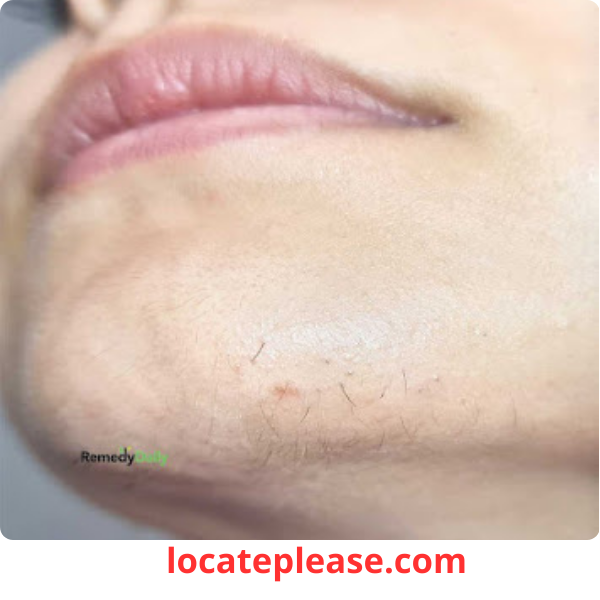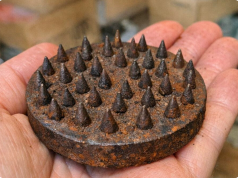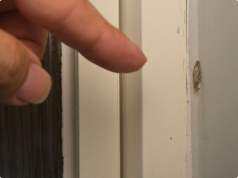Let’s talk about something many women notice but rarely discuss:
👉 Coarse hairs appearing on the chin.
You pluck one.
Then another.
Then a few more.
At first, it feels like a normal part of aging — just a stray hair here and there, easily tweezed away.
Annoying, yes — but harmless, right?
But what if those “chin whiskers” aren’t random at all?
What if they’re your body’s quiet, persistent way of saying:
“Something’s off.”
Because while the occasional facial hair is completely normal, sudden, thick, or increasing hair growth on the chin and jawline can be a visible red flag — a physical clue pointing to deeper imbalances in your hormones, metabolism, or overall health.
Let’s break down what chin whiskers could really mean — and when it’s time to listen.
🧪 1. Hormonal Imbalance — The Most Common Culprit
The primary reason women grow hair on the chin?
Androgens — often called “male hormones,” though all women naturally produce them in small amounts.
When androgen levels rise — even slightly — they can trigger hirsutism: a condition marked by excess hair growth in male-pattern areas, including:
- Chin
- Jawline
- Upper lip
- Neck
- Chest
This isn’t about gender — it’s about hormonal balance.
And when that balance tips, your skin and hair follicles are often the first to show it.
🔍 Common Causes of Elevated Androgens:
- Polycystic Ovary Syndrome (PCOS) – Ovaries produce too much testosterone
- Menopause – Declining estrogen can lead to relative androgen dominance
- Thyroid disorders – Hypothyroidism can disrupt hormone regulation
- Insulin resistance – High insulin levels stimulate androgen production
- Medications – Certain steroids, birth control pills, or hormone therapies
- Adrenal imbalances – Overactive adrenal glands can overproduce androgens
✅ When to Pay Attention:
If chin hair growth comes with any of the following, it’s time to consider a hormone evaluation:
- Irregular or absent periods
- Acne (especially along the jawline)
- Unexplained weight gain (especially around the waist)
- Hair thinning or loss on the scalp
- Difficulty losing weight
These aren’t just “annoyances” — they’re symptoms.
And together, they may point to an underlying condition.
🌀 2. Polycystic Ovary Syndrome (PCOS) — A Key Indicator
PCOS affects 1 in 10 women of reproductive age — and excess facial hair is one of its most telling signs.
But PCOS is far more than a cosmetic issue.
It’s a complex metabolic and hormonal disorder that can impact:
- Fertility
- Blood sugar regulation
- Cardiovascular health
- Mental well-being
And chin whiskers?
They’re often one of the earliest visible clues.
Other common signs of PCOS:
- Ovarian cysts (not always present)
- Insulin resistance or prediabetes
- Mood swings, anxiety, or depression
- Skin tags or darkened skin (acanthosis nigricans)
If you’re dealing with persistent chin hair and irregular cycles, don’t brush it off.
Talk to your doctor about checking for PCOS with blood work and an ultrasound.
🔁 3. Menopause and Perimenopause — Hormonal Shifts Take Over
As women approach perimenopause and menopause, estrogen levels decline — but androgens don’t drop as much.
This shift creates a state of relative androgen dominance, which can lead to:
- Thicker, darker chin hairs
- Thinning hair on the scalp
- Dry skin and changes in body composition
It’s not “just aging” — it’s hormonal recalibration.
And while some facial hair growth is common during this stage, sudden or dramatic changes should still be evaluated.
🦋 4. Thyroid Dysfunction — A Hidden Link
Your thyroid gland plays a surprisingly big role in hair growth — both on your head and face.
Hypothyroidism (an underactive thyroid) is linked to:
- Dry skin
- Hair loss
- Fatigue
- Weight gain
- And paradoxically — facial hair growth
Why?
Thyroid hormones help regulate sex hormone-binding globulin (SHBG), which controls how much free testosterone circulates in your blood.
When thyroid function slows, SHBG drops — leading to more available androgens.
If you’re growing chin hairs and feeling sluggish, cold, or bloated, ask for a full thyroid panel — not just TSH.
🍬 5. Insulin Resistance — The Silent Driver
High insulin levels don’t just affect blood sugar — they directly stimulate the ovaries to produce more androgens.
This creates a vicious cycle:
- Insulin resistance →
- Increased androgens →
- More facial hair and acne →
- Weight gain →
- Worsened insulin resistance
This is especially common in women with PCOS, but it can affect anyone with poor diet, stress, or sedentary lifestyle.
The good news?
This cycle can be broken with lifestyle changes — diet, movement, and sleep.
🧬 Other Possible Causes
While hormones are the most common explanation, other factors can contribute:
- Genetics – Some women naturally grow more facial hair (common in Mediterranean, Middle Eastern, or South Asian descent)
- Certain medications – Like minoxidil, anabolic steroids, or some antipsychotics
- Rare tumors – Ovarian or adrenal tumors that secrete androgens (very rare, but possible)
🛑 When to See a Doctor
Don’t panic over a single stray hair — that’s normal.
But see a healthcare provider if you notice:
- Rapid increase in facial hair
- Coarse, dark hairs in male-pattern areas
- Any of the symptoms listed above (irregular periods, acne, weight gain, etc.)
Your doctor may order:
- Hormone panel (testosterone, DHEA-S, SHBG)
- Thyroid function tests
- Blood sugar and insulin levels
- Pelvic ultrasound (if PCOS is suspected)
✅ What You Can Do
Even if you’re not ready for medical treatment, you can support your body:
- Eat a low-glycemic, anti-inflammatory diet — rich in fiber, healthy fats, and protein
- Exercise regularly — even walking helps balance hormones
- Manage stress — cortisol worsens hormonal imbalances
- Consider supplements — like inositol, magnesium, or vitamin D (under guidance)
- Avoid harsh hair removal methods — waxing or plucking can cause ingrown hairs and irritation
For unwanted hair, options include:
- Laser hair removal – Long-term reduction
- Electrolysis – Permanent removal
- Topical creams – Like eflornithine (prescription)
💬 Final Thoughts: Your Body Is Speaking — Are You Listening?
That chin hair isn’t just “annoying.”
It might be your body’s way of asking for help.
Instead of just tweezing it away, consider:
👉 What is this telling me?
Because sometimes, the most important health signals aren’t in blood tests —
They’re right on the surface, waiting to be seen.
So the next time you reach for the tweezers…
Pause.
Look deeper.
And give your body the care it deserves.
Your skin isn’t just a mirror — it’s a message.






